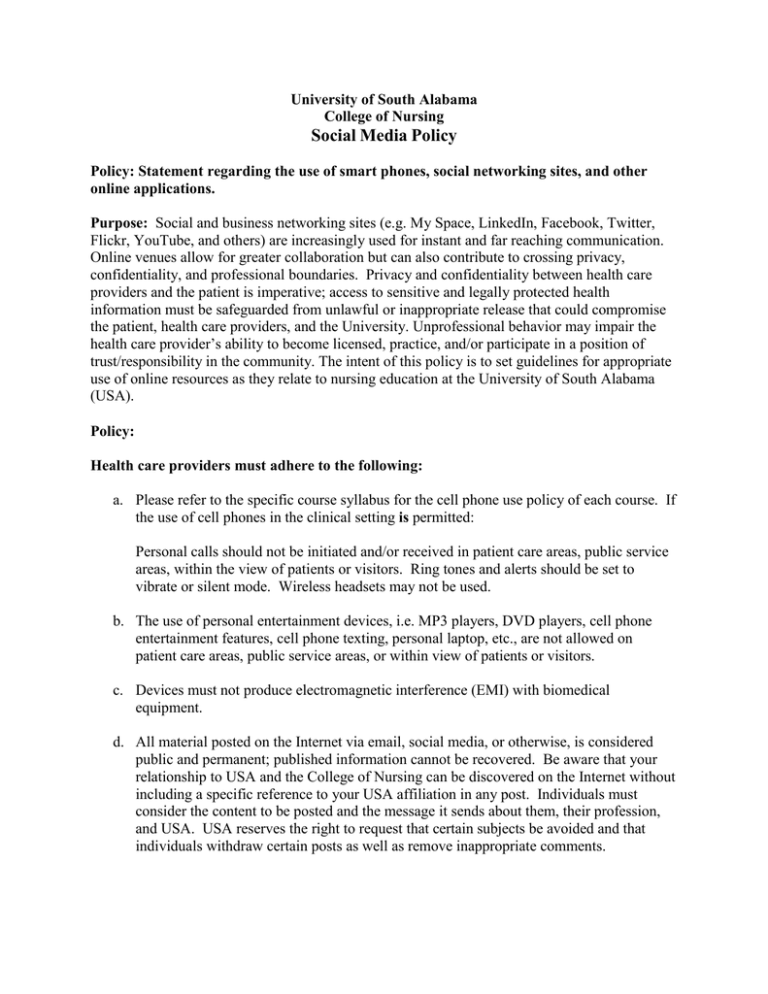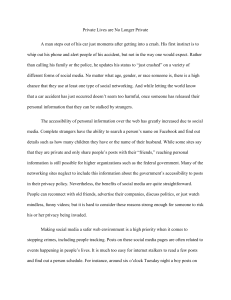Social Media Policy
advertisement

University of South Alabama College of Nursing Social Media Policy Policy: Statement regarding the use of smart phones, social networking sites, and other online applications. Purpose: Social and business networking sites (e.g. My Space, LinkedIn, Facebook, Twitter, Flickr, YouTube, and others) are increasingly used for instant and far reaching communication. Online venues allow for greater collaboration but can also contribute to crossing privacy, confidentiality, and professional boundaries. Privacy and confidentiality between health care providers and the patient is imperative; access to sensitive and legally protected health information must be safeguarded from unlawful or inappropriate release that could compromise the patient, health care providers, and the University. Unprofessional behavior may impair the health care provider’s ability to become licensed, practice, and/or participate in a position of trust/responsibility in the community. The intent of this policy is to set guidelines for appropriate use of online resources as they relate to nursing education at the University of South Alabama (USA). Policy: Health care providers must adhere to the following: a. Please refer to the specific course syllabus for the cell phone use policy of each course. If the use of cell phones in the clinical setting is permitted: Personal calls should not be initiated and/or received in patient care areas, public service areas, within the view of patients or visitors. Ring tones and alerts should be set to vibrate or silent mode. Wireless headsets may not be used. b. The use of personal entertainment devices, i.e. MP3 players, DVD players, cell phone entertainment features, cell phone texting, personal laptop, etc., are not allowed on patient care areas, public service areas, or within view of patients or visitors. c. Devices must not produce electromagnetic interference (EMI) with biomedical equipment. d. All material posted on the Internet via email, social media, or otherwise, is considered public and permanent; published information cannot be recovered. Be aware that your relationship to USA and the College of Nursing can be discovered on the Internet without including a specific reference to your USA affiliation in any post. Individuals must consider the content to be posted and the message it sends about them, their profession, and USA. USA reserves the right to request that certain subjects be avoided and that individuals withdraw certain posts as well as remove inappropriate comments. e. Individuals should use separate personal and professional social networking accounts. For personal activity, the use of a non-USA email address as your primary means of contact is required. f. Interacting with any current or former patient on any social networking site or checking patient profiles on social networking sites is prohibited. g. University computers should only be accessed to complete patient care related activities. Privacy is compromised when using institutional computers. h. The individual is responsible for the content of his/her own internet and social media blogs/posts, pictures, etc. including but not limited to any legal liability incurred (defamation, harassment, obscenity, privacy issues regarding students or patients, etc). i. The tone and content of all electronic conversations should remain professional. Respect among colleagues and co-workers must occur in an interprofessional environment. j. Do not post any content that is inappropriate. Inappropriate content includes, but is not limited to, material that is obscene, defamatory, profane, libelous, threatening, harassing, abusive, hateful, or embarrassing to another person or entity. Patient Information Identifiable protected health information (PHI) must never be posted on the Internet. This applies even if no one other than a patient is able to identify him/herself from the posted information. Health care providers must adhere to all Health Information Patient Privacy Act (HIPPA) principles. Patient images may be obtained and transmitted only with written consent per the host facility policy. Patient images may only be obtained and transmitted on institutional equipment and never on personal equipment. Providing Medical Advice Medical advice on a social networking site should never be provided. Privacy Settings Health care providers should consider setting privacy at the highest level on all social networking sites. The policy is not meant to discourage the use of innovative technologies, but to provide guidance and heighten the awareness of health care professionals associated with this University to the potential risks and consequences associated with technology. The Social Media Policy applies to all students, staff, and faculty. Violations of this policy or any USA computer or information privacy policies or laws will lead to disciplinary action up to and including dismissal/termination and/or legal action. Approved 3/24/14

